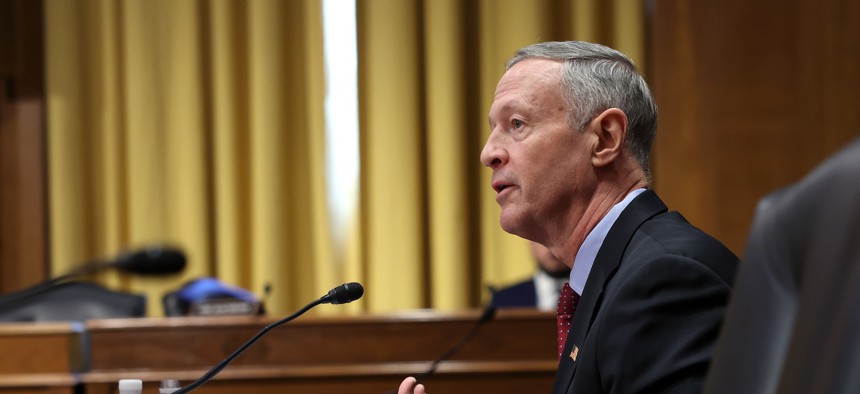SSA needs funding to address its ‘customer service crisis,’ commissioner says

Martin O'Malley testifies at his Senate confirmation hearing on Nov. 2, 2024. Kevin Dietsch/Getty Images
Applicants have to wait eight months on average for an initial disability decision.
The Social Security Administration is trying to improve its admittedly dismal customer service, but it needs more funding to be able to do so, according to its commissioner, Martin O’Malley.
The agency’s “operating overhead has effectively been reduced by about 20% just over the last 10 years,” said O’Malley during a hearing held by the Senate Special Committee on Aging last week.
“The result is that we are in a customer service crisis,” he continued. “We can and must do better.”
The administration is requesting the authority to use $15.4 billion for SSA administrative costs — or a $1.3 billion increase — in its fiscal 2025 budget request. The agency is funded by its trust funds, although Congress sets limits for what it can use on administrative expenses.
SSA got a nearly $800 million budget increase in fiscal 2023 after years of flat funding with increasing demands, only to have to pause hiring under continuing resolutions, according to O’Malley’s written testimony.
By the end of this fiscal year, the agency will be working with over seven million more beneficiaries while operating with 7,000 less full-time, permanent staff as compared to fiscal 2015.
O’Malley says that he’s focusing on three challenges in particular: wait times for disability determinations; phone call wait times; and over- and under-payment issues at the agency. Since being confirmed last December, O’Malley said that he’s set up recurring “Security Stat” meetings with leadership to address major problems.
Currently, the wait time for an initial disability decision is almost eight months, or 228 days. SSA is also trying to tame a backlog of 1.1 million pending initial disability claims, as of fiscal 2023. The agency says the budget request could help cut that backlog by 15%.
Staffing shortages and problems hiring and retaining employees in state disability determination services — the federally funded state agencies that make most initial disability decisions — have contributed to the problems, according to SSA, which says it would use some of the money it's requesting from Congress for hiring.
The wait time for those that request a reconsideration of initial decisions is another seven months, said O’Malley. The agency’s goal is to get wait times down to 4 months for both initial decisions and those that request reconsiderations, O’Malley wrote in his testimony.
The agency is also trying to get the wait time for those that request a hearing, what O’Malley called “the next level of appeal,” down to 270 days, or 9 months, from the current wait time of a year to get a decision.
Americans looking to use the agency’s 1-800 phone line are also seeing delays — currently, the wait time is 38 minutes.
The agency fields five million to seven million calls monthly, but about 4 million of those callers hang up due to the wait, O’Malley wrote in his testimony.
The long-term goal is to get that down to 5 minutes, although SSA says it could cut it to 12 minutes with the budget request, which would help with staffing problems, especially since its call centers have a 22% attrition rate.
There is some good news. SSA recently modernized its phone systems — a process that was paused during the pandemic — which has “virtually eliminated” the busy signals that plagued the interim system, and also offers estimated wait times and callback assistance, the agency says.
SSA is looking to Congress for an over $200 million plus-up for information technology overall in its most recent budget request. O’Malley told lawmakers recently that over 90% of the agency’s tech budget goes to maintaining old systems.
Finally, the agency is also working on sorting out the high-profile problems with how it handles overpayments.
SSA has gotten attention for news about its policy of asking individuals for money back, even when the recipient isn’t at fault. O’Malley said that the agency is already making changes, including making it easier for people to get a waiver for the repayment if they believe they’re not at fault or can’t pay.






